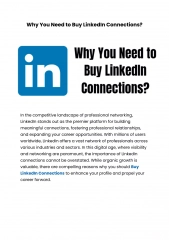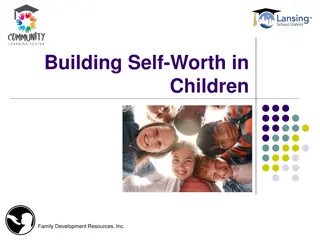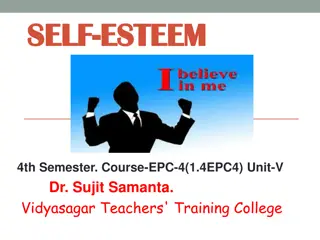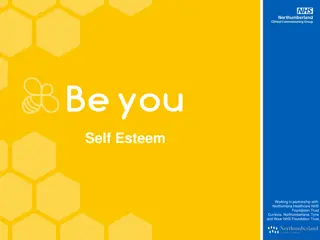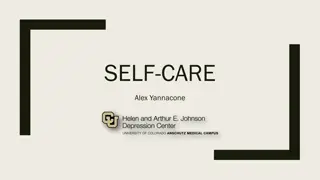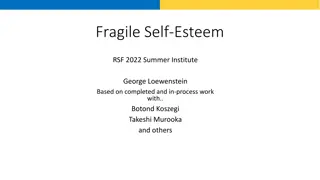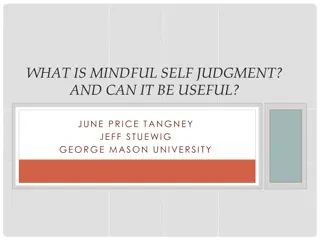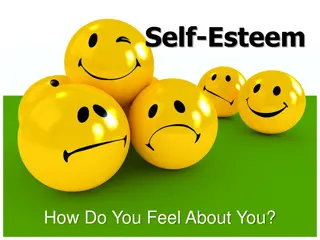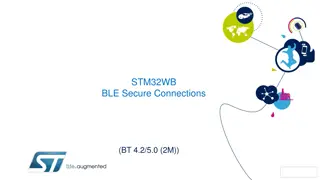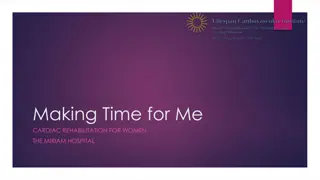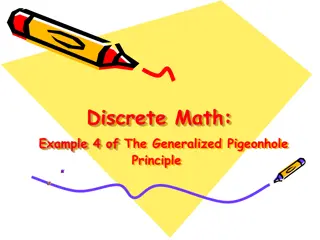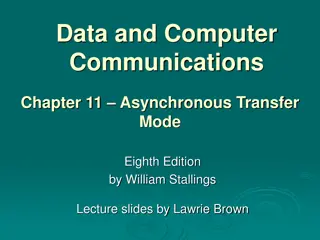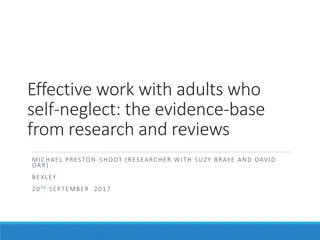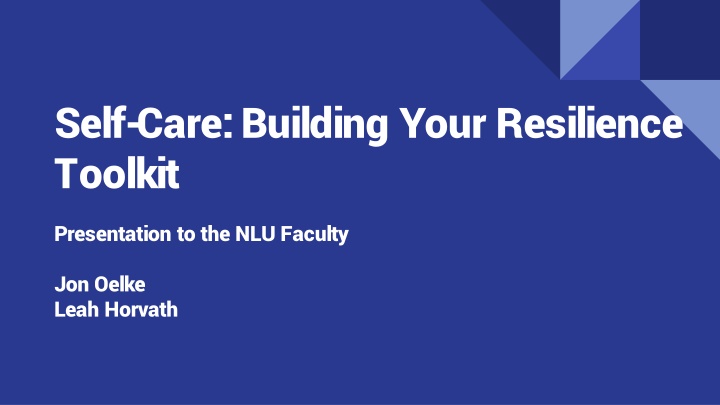
Building Your Resilience Toolkit: Prioritizing Self-Care for Well-being
Explore the importance of self-care in different life domains, understand obstacles hindering self-care practices, and discover coping mechanisms to enhance resilience. Learn how self-care is fundamental for overall well-being and developing a resilience toolkit for daily practice.
Download Presentation

Please find below an Image/Link to download the presentation.
The content on the website is provided AS IS for your information and personal use only. It may not be sold, licensed, or shared on other websites without obtaining consent from the author. If you encounter any issues during the download, it is possible that the publisher has removed the file from their server.
You are allowed to download the files provided on this website for personal or commercial use, subject to the condition that they are used lawfully. All files are the property of their respective owners.
The content on the website is provided AS IS for your information and personal use only. It may not be sold, licensed, or shared on other websites without obtaining consent from the author.
E N D
Presentation Transcript
Self-Care: Building Your Resilience Toolkit Presentation to the NLU Faculty Jon Oelke Leah Horvath
Check-in Icebreaker Use the JamBoard to share some progress you ve made on self-improvement since the beginning of the pandemic. You can add an image or use a sticky note. Sticky Note Link to JamBoard -or copy the link below Add an image https://jamboard.google.com/d/1TOVIy7IS- 4w7SJEK3gGFwP418RpVDwkaWA9giLUm- Oc/edit?usp=sharing
Defining Self-Care What comes to mind when you hear these words? Consider how you care for yourself in each of these domains: Physical Emotional/Well-being Spiritual Social/Relationships Intellectual/Work Financial Environmental - - - - - - -
What gets in the way of self-care? We all know self-care is good for us -but we aren t always the best at prioritizing our health and well-being. So what gets in the way for you? - - - - - - Too busy/not enough time Not making myself a priority/putting other people s needs first Fear of asking for help Difficulty setting boundaries and saying no Not part of your routine Not something that was taught or modeled for you
Share What Helps You Cope Outdoor activities (hiking or biking) Sports Working out Board games Chatting with friends People-watching Binging a new show on Netflix Reading that new novel that s meant to be for tweens, but omg you just can t get enough
Building Your Resilience Toolkit (Bank Account) Think of self-care as more than an activity -it s a daily practice -a way of living. If we are in the habit of taking care of our whole self and regularly checking in on areas that need attention, we ll be better positioned to manage bigger crises. Just like it s recommended to have a safety net of financial savings (if possible), we want to have a safety net of resiliency.
Building Your Resilience Toolkit (Bank Account) Physical - Emotional/Well-being - Managing stress, expressing emotion, engaging in therapy, cognitive reframing, doing things you enjoy Spiritual - Connecting with your beliefs and values and living in accord with those Social/Relationships - Tending to relationships with family, friends, partners, co-workers, neighbors; pruning unhealthy relationships Intellectual/Work - Staying curious, learning, finding meaning/value in your work Financial - Living within financial means, creating a budget, spending in a values-consistent way Environmental - Caring for your surroundings, inside and out; avoiding clutter, keeping things that have meaning Exercise, sleep, nutrition, treating illnesses, taking medications as prescribed
Building Your Resilience Toolkit -Setting Boundaries Make time to reflect on your boundaries (with work, family, friends, communities, and other relevant areas). Consider: - What is okay for you - What is not okay for you - What you require others to respect about you and your life Periodically check-in on your boundaries -are you holding to them? Flexibility is okay if it s done with thoughtful intention. Practice saying no. Others may be disappointed -and that s okay.
Building Your Resilience Toolkit -Mindfulness Paying attention in a particular way: On purpose, in the present moment, in a nonjudgmental way -Jon Kabat-Zinn There are many cognitive, emotional, and physical benefits of regular mindfulness practice. Regular practice can mean even just 2 minutes a day! Quick Demo! The goal here is to simply choose to tune in to your present moment. Decide to open your awareness to whatever comes or to focus your awareness on something particular. - Sounds, sensations, counting the breath, noticing thoughts.
Building Your Resilience Toolkit -Gratitude Having a gratitude practice shifts your focus to what is good in your life and world. There are lots of ways to keep this practice: - Gratitude journal - Family sharing at mealtimes - A gratitude jar - Gratitude in prayers Be specific and think small - Identify specific, small moments for which you are grateful Share with others (if you want) - Writing notes of thanks and gratitude boost emotions for you and the receiver
Building Your Resilience Toolkit -Self-Compassion The ongoing practice of relating to yourself kindly and fairly -not a blanket approval or dismissal of your faults and areas of growth Be your own best friend -when going through tough times, think of how you d support your best friend Treat minor hurts and rejections - if you had a cut on your finger, you d bandage it. Otherwise, you risk an infection. Minor emotional hurts need the same attention -ignoring them can lead to worsening outcomes Check your language -what kinds of things do you say to yourself when you do something wrong or fail? Use cognitive reframing -consider how to challenge what you say to yourself. - Is what you are saying true? - Is it fair? - Does it take into account other perspectives? - And, even if it is true -is it helpful?
Tools for your Toolkit Values Assessment and Alignment https://thehappinesstrap.com/upimages/Values_Questionnaire.pdf Practice Mindfulness Check out The Happiness Lab podcast -episode: Coronavirus Bonus: Calm Can be Contagious - https://www.happinesslab.fm/coronavirus-bonus-episodes/episode-4-calm-can-be-contagious Increase mindfulness with these recorded practices: https://www.uclahealth.org/marc/mindful-meditations Practice Gratitude https://www.mindful.org/an-introduction-to-mindful-gratitude/ Practice Self-Compassion Assess your self-compassion: https://self-compassion.org/test-how-self-compassionate-you-are/ Check out The Happiness Lab podcast -episode: Treating the Pain of a Broken Heart https://www.happinesslab.fm/season-3/episode-2-treating-the-pain-of-a-broken-heart Increase self-compassion with these practice ideas: https://self-compassion.org/category/exercises/ Self-compassion self-help workbook: https://www.cci.health.wa.gov.au/Resources/For-Clinicians/Self-Compassion Setting SMART-ER Goals https://oregoncounseling.com/article/how-to-set-mental-health-goals-for-2021/
References Butler, L. D., Mercer, K. A., McClain-Meeder, K., Horne, D. M., & Dudley, M. (2019) Six domains of self-care: Attending to the whole person, Journal of Human Behavior in the Social Environment, 29(1), 107-124. Davis, D. M., & Hayes, J. A. (2011). What are the benefits of mindfulness? A Practice review of psychotherapy-related research. Psychotherapy, 48(2), 198- 208. Doll, A., H lzel, B. K., Mulej Bratec, S., Boucard, C. C.,, Xie, X., Wohlschl ger, A. M., et al. (2016). Mindful attention to breath regulates emotions via increased amygdala-prefrontal cortex connectivity. Neuroimage, 134, 305-313. Emmons R.A., McCullough M.E. (2003). Counting blessings versus burdens: An experimental investigation of gratitude and subjective well-being in daily life Journal of Personality and Social Psychology, 84, 377 389 Fredrickson B.L., Tugade M.M., Waugh C.E., Larkin G. (2003). What good are positive emotions in crises?: A prospective study of resilience and emotions following the terrorist attacks on the United States on September 11th, 2001. Journal of Personality and Social Psychology, 84, 365 376 Holowaychuk, M. K.(2018). Setting boundaries to protect personal time. Veterinary Team Brief, 13-17. Nelson, J. R., Hall, B. S., Anderson, J. L., Birtles, C. & Hemming, L. (2018) Self Compassion as self-care: A simple and effective tool for counselor educators and counseling students, Journal of Creativity in Mental Health, 13(1), 121-133. Plutt, H., & Wonders, J. (2020). Not able to lead a healthy life when you need it the most: Dual role of lifestyle behaviors in the association of blurred work-life boundaries with well-being. Frontiers in Psychology, 11, 1-15. Tugade, M.M., Fredrickson, B.L. (2007). Regulation of positive emotions: Emotion regulation strategies that promote resilience. Journal of Happiness Studies, 8, 311 333.

